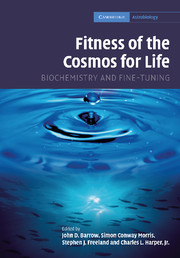Book contents
- Frontmatter
- Contents
- List of contributors
- Foreword: The improbability of life
- Preface
- Acknowledgments
- Part I The fitness of “fitness”: Henderson in context
- 1 Locating “fitness” and L. J. Henderson
- 2 Revisiting The Fitness of the Environment
- 3 Is fine-tuning remarkable?
- 4 Complexity in context: the metaphysical implications of evolutionary theory
- 5 Tuning fine-tuning
- Part II The fitness of the cosmic environment
- Part III The fitness of the terrestrial environment
- Part IV The fitness of the chemical environment
- Index
- References
1 - Locating “fitness” and L. J. Henderson
Published online by Cambridge University Press: 18 December 2009
- Frontmatter
- Contents
- List of contributors
- Foreword: The improbability of life
- Preface
- Acknowledgments
- Part I The fitness of “fitness”: Henderson in context
- 1 Locating “fitness” and L. J. Henderson
- 2 Revisiting The Fitness of the Environment
- 3 Is fine-tuning remarkable?
- 4 Complexity in context: the metaphysical implications of evolutionary theory
- 5 Tuning fine-tuning
- Part II The fitness of the cosmic environment
- Part III The fitness of the terrestrial environment
- Part IV The fitness of the chemical environment
- Index
- References
Summary
Crane Brinton, Harvard historian, friend of Lawrence J. Henderson, and fellow member of The Saturday Club, wrote the obituary for Henderson in the Club's third commemorative volume (Brinton, 1958, p. 207). Noting that Henderson was somewhat out of the ordinary – crossing the Charles River on several occasions to keep appointments at the Medical School (Boston) and the College (Cambridge) and then recrossing it to get to the Business School (Boston) – Brinton went on to note Henderson's other non-traditional characteristics: “Ticketed as a biological chemist, he later took the title physiologist and, although he would not have liked the name, at the end of his career he was a sociologist [emphasis added].”
Brinton went on: “A cross section of his publications may indeed be so drawn up as to seem an academic scandal.” Brinton ran through the publications, from the well-known The Fitness of the Environment (1913) and The Order of Nature (1917); the more esoteric On the Excretion of Acid from the Animal Organism (1910, 1911); the simple volume Blood: A Study in General Physiology (1928); the unexpected transcript of an interview on the experiments in the Liberty Bread Shop (Brinton, 1958, p. 208); in his later life, The Study of Man (1941); to Pareto's General Sociology: A Physiologist's Interpretation (1935). Brinton jocularly added that a piece by Henderson – a biographical memoir on the life of the poet Edwin Arlington Robinson (a close friend from his student days) written as a memoir for the American Academy of Arts and Sciences – is to be found in the Woodberry Poetry Room of Harvard's Lamont Library.
- Type
- Chapter
- Information
- Fitness of the Cosmos for LifeBiochemistry and Fine-Tuning, pp. 3 - 19Publisher: Cambridge University PressPrint publication year: 2007

